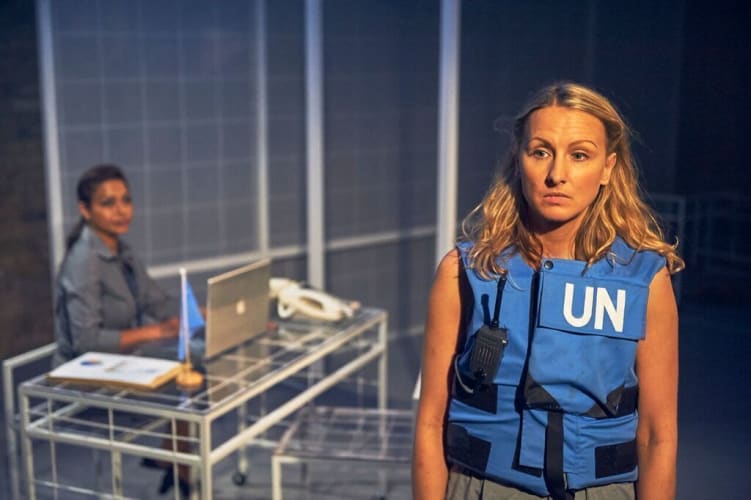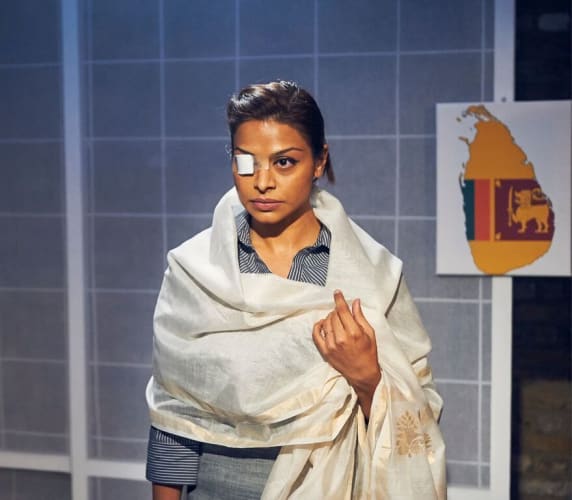For over a quarter of a century, there was civil war in Sri Lanka between the Tamil Tigers, who fought for an independent Tamil state in north and east Sri Lanka, and government forces. There has been enormous loss of life, both soldiers and civilians, and both sides have been accused of committing war crimes. It is claimed that in the last five months before it ended between 40,000 and 70,000 civilians died.
Christine Bacon’s play is not a history of that war but centres on attempts to end it, led by the diplomacy of Norwegian politician Erik Solheim, and although many of its characters represent real people it is not a documentary but a work of fiction, closely based on fact.
It opens in 1999 with voice-over facts that could come from a guidebook or a newscast and a projected montage of photographs from the conflict. An unsettling throbbing that has been in the background rises in volume and there are gunshots as the characters assemble on stage, including Tamil Nila and English UN humanitarian officer Rebecca. Then it is straight into a meeting in London.
Erik Solheim is making his first approach to Anton Balasingham, a Tamil with British citizenship who is the Tigers’ elder statesman and main negotiator. That meeting segues into one with Chandrika Kumaratunga, President of Sri Lanka. Talks are just beginning when an assassination attempt robs Chandrika of an eye.
A ping-pong of diplomatic negotiations runs in parallel with the experience on the ground of Rebecca, her UN boss, on the one hand presenting their contacts with Sri Lankan officialdom and on the other their first hand experience of the life of those they are there to aid: people who, in 2004 also suffered huge losses from the Indian Ocean tsunami.
A stark visual pattern, lighting, a build-up of sound and the fast pace of the production create a powerful sense of the confusion and relentless oppressiveness of living in a war zone, the setting echoes the frustrations of diplomatic straitjackets.
There is little chance to take in the reasons for the conflict and, though the text gives a voice to both sides, the emotional heart of the drama is with civilian Anil, caught up in the conflict and Rebecca, hamstrung by the conditions imposed upon her presence. There is a passionate performance by Claire Dargo as Rebecca and Nikki Patel gives personality to a character who stands for so many innocent victims. In a particularly moving moment, as Anil translates, a Tamil man ironically asking Rebecca to photograph the bodies of his wife and children who have just been killed.
Ria Parry’s production ensures it has impact and draws strong performances from all her cast. Clive Hayward brings a calm intelligence to Erik Solheim’s diplomatic exchanges. Ayesha Darker is smoothly charming Chandrika, made steelier perhaps by the assassination of her father and then of her husband, shot in front of her and her children, as well as the attack on her own life—and becomes quite different double as the local UN official who has to negotiate with government.
Neran Persaud brings great sincerity to the aging, ailing Balasingham but with just a hint that he acknowledges things that he can’t mention, then is quite different as arms dealer KP who is his replacement negotiator, while Bally Gill is a hard-bitten Sri Lankan Foreign Ministry official and a harassed UN worker.
Although the details here may be fiction, this play’s purpose is documentary. This is a war that has largely been ignored by the wider worlds. It is a shocking story.
A photography exhibition has this week opened in Colombo that reflects on the final stages of the Sri Lankan civil war. It is described as a meditation on its trauma and its memory. The Island Nation is too, to some extent, but it also feels like an indictment.
There is need for real reconciliation in Sri Lanka but, the end of the play suggests, the image presented to tourists flocking to its sun-drenched beaches is one-sided and distorted; but one day people will know the truth.




